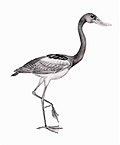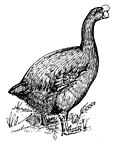Ankonetta
Appearance
| Ankonetta Temporal range: Early Miocene (Santacrucian)
| |
|---|---|
| Scientific classification | |
| Domain: | Eukaryota |
| Kingdom: | Animalia |
| Phylum: | Chordata |
| Class: | Aves |
| Order: | Anseriformes |
| Family: | Anatidae |
| Genus: | †Ankonetta Cenizo & Agnolín, 2010 |
| Species: | †A. larriestrai
|
| Binomial name | |
| †Ankonetta larriestrai Cenizo & Agnolín, 2010
| |
Ankonetta is an extinct genus of mid-sized anatid birds that lived during the Miocene. Its holotype was found in the Early Miocene (Santacrucian), Santa Cruz Formation in Argentina. The type species is A. larriestrai.[1][2]
Etymology
[edit]The genus name is derived from Aónikenk, a group of indigenous Tehuelche-speaking people from Patagonia. Anko means "father" and netta is derived from Greek, meaning "duck". The species epithet refers to Claudio Larriestra, who studied the Pinturas Formation, another important fossiliferous formation of Patagonia.[3]
References
[edit]- ^ Cenizo & Agnolín, 2010, p.499
- ^ Ankonetta larriestrai at Fossilworks.org
- ^ Cenizo & Agnolín, 2010, p.500
Bibliography
[edit]- Cenizo, Marcos Martín; Agnolín, Federico Lisandro (2010), "The southernmost records of Anhingidae and a new basal species of Anatidae (Aves) from the lower–middle Miocene of Patagonia, Argentina", Alcheringa: An Australasian Journal of Palaeontology, 34 (4): 493–514, Bibcode:2010Alch...34..493C, doi:10.1080/03115511003793504, retrieved 2019-02-28


